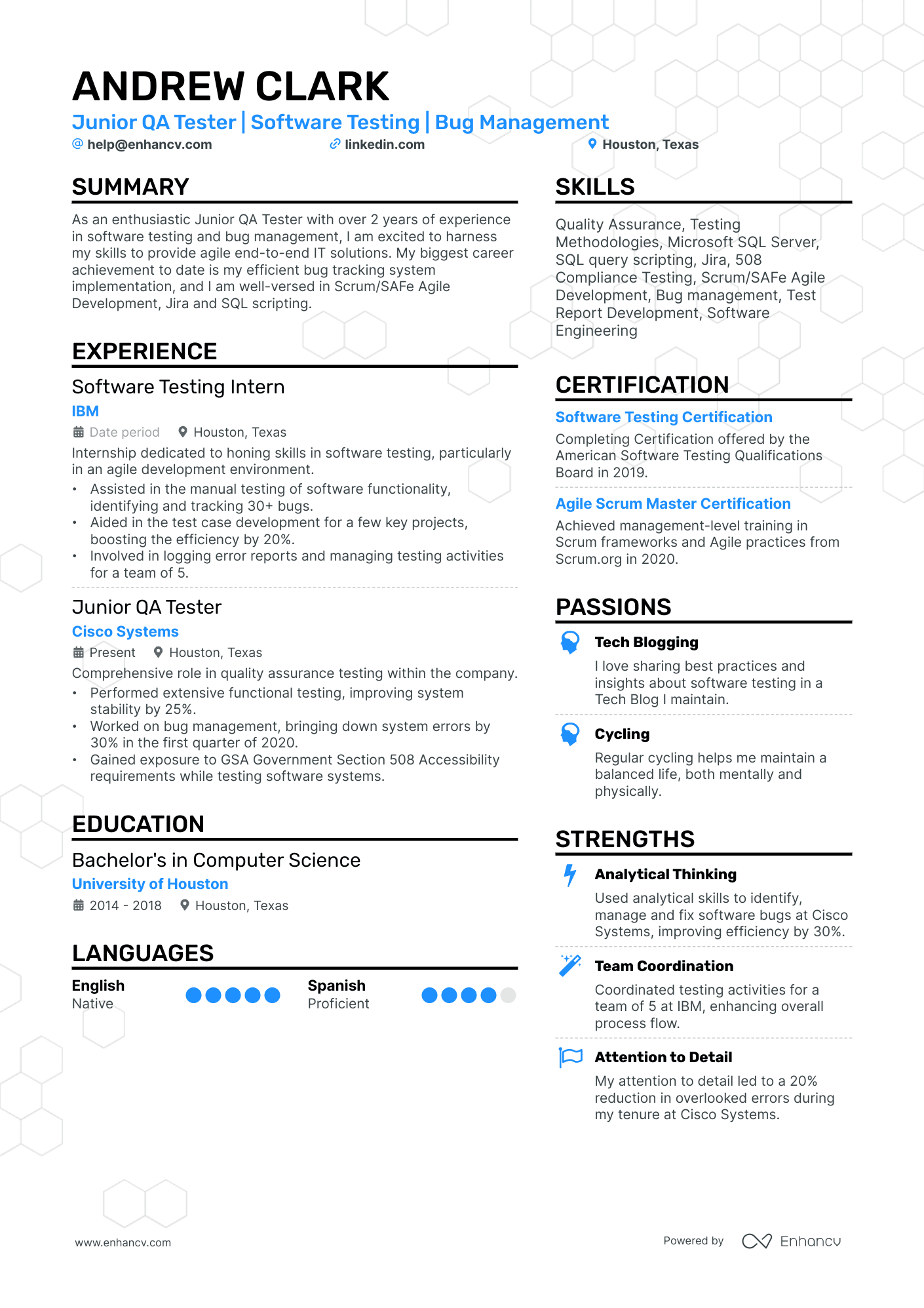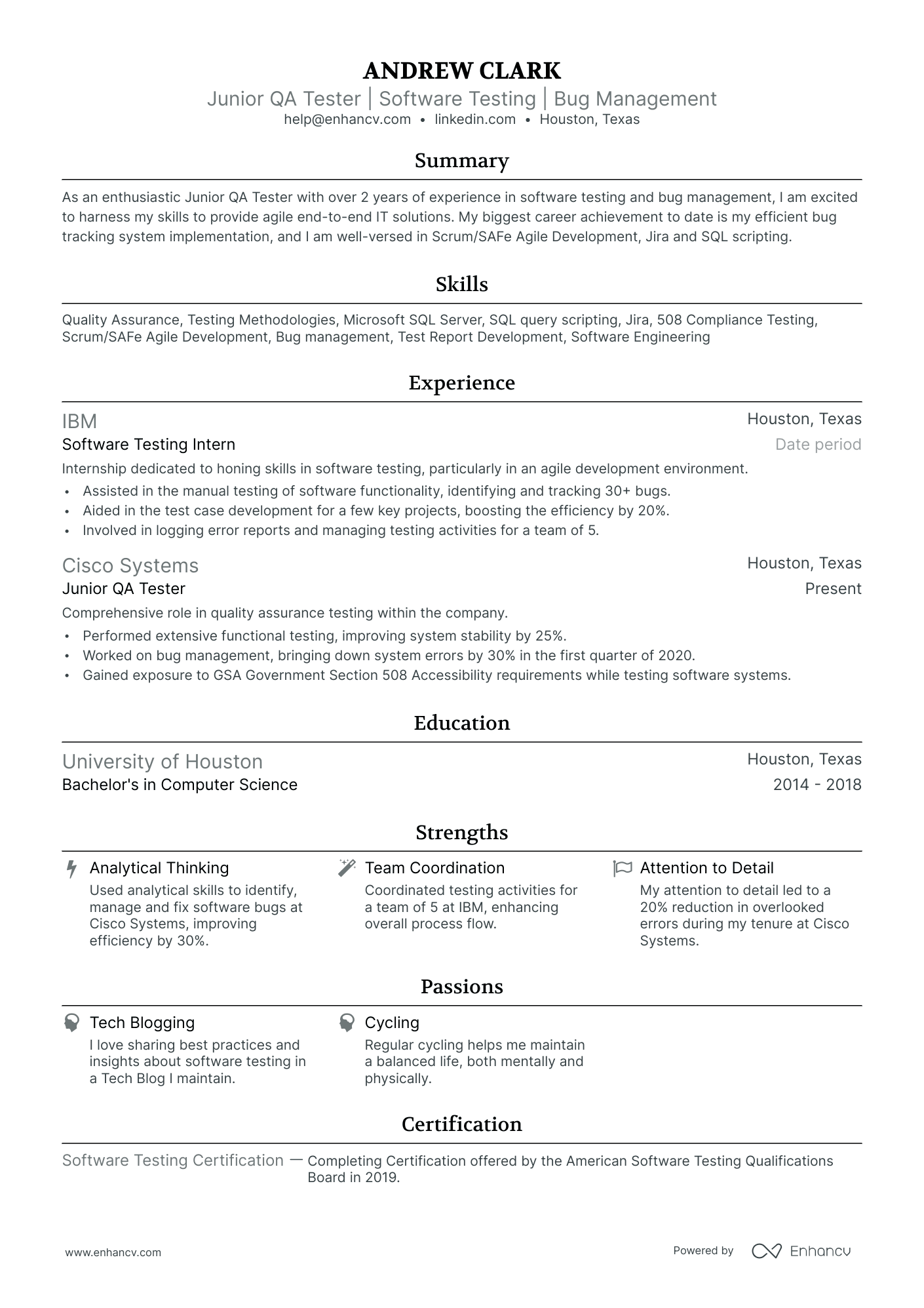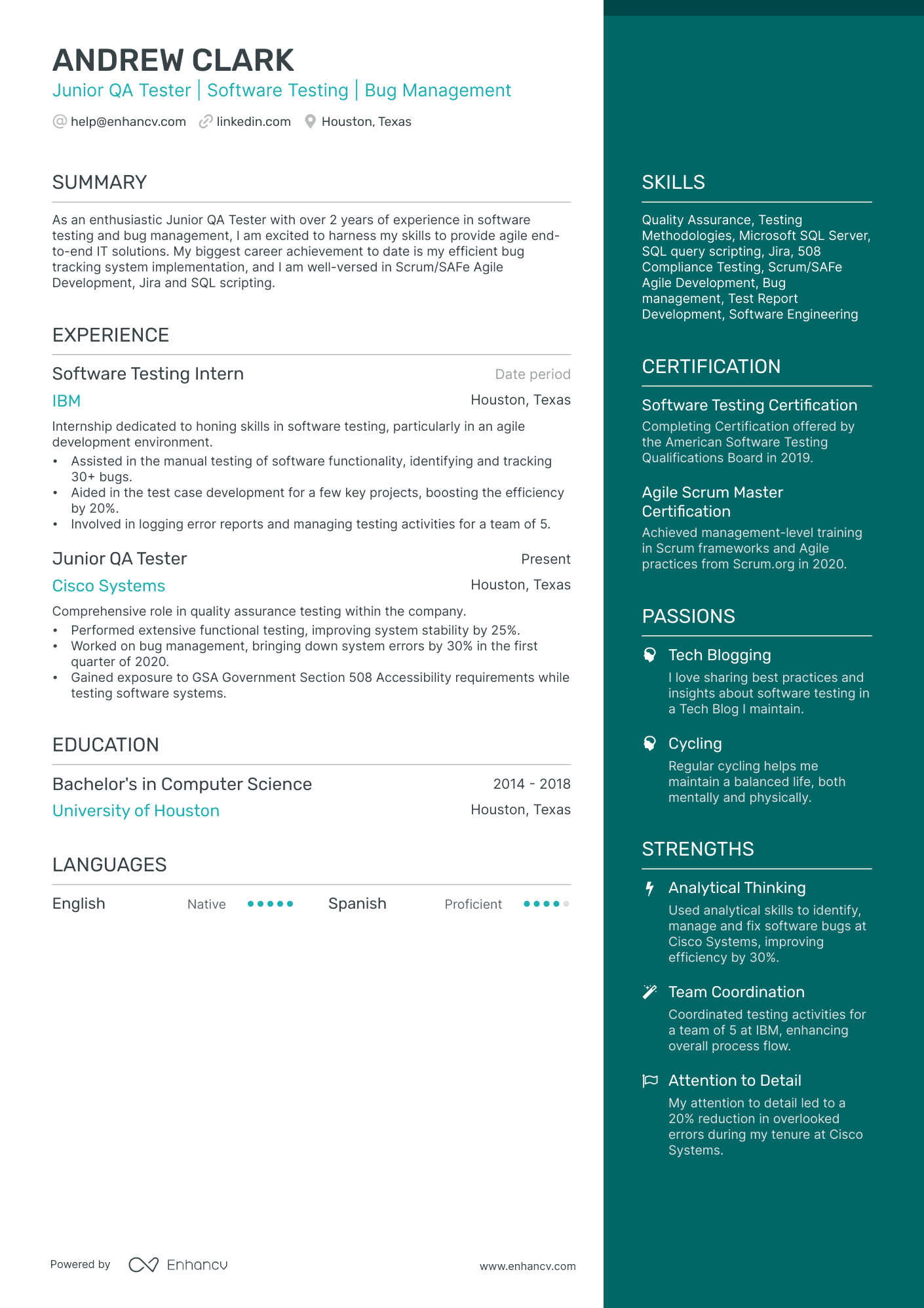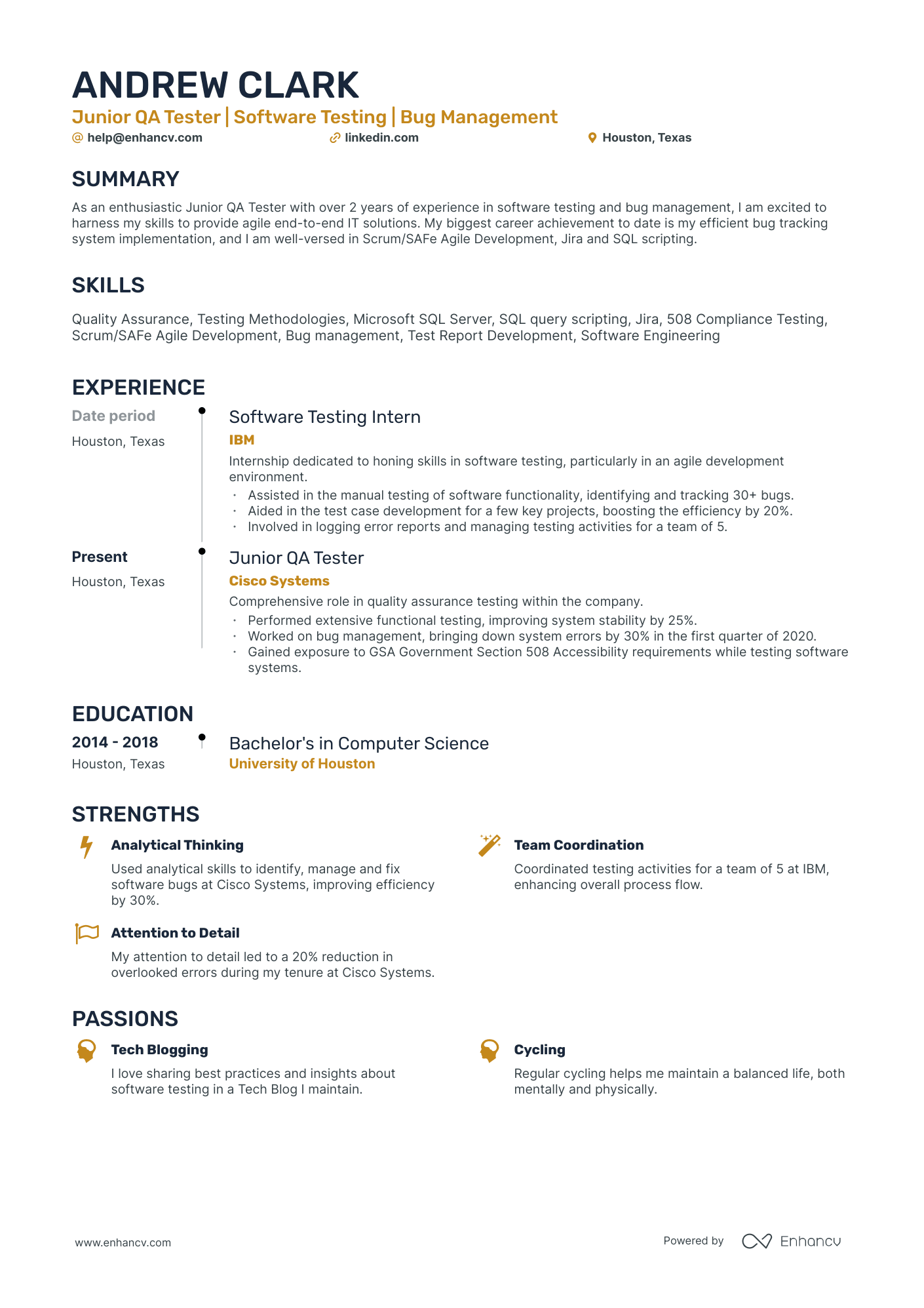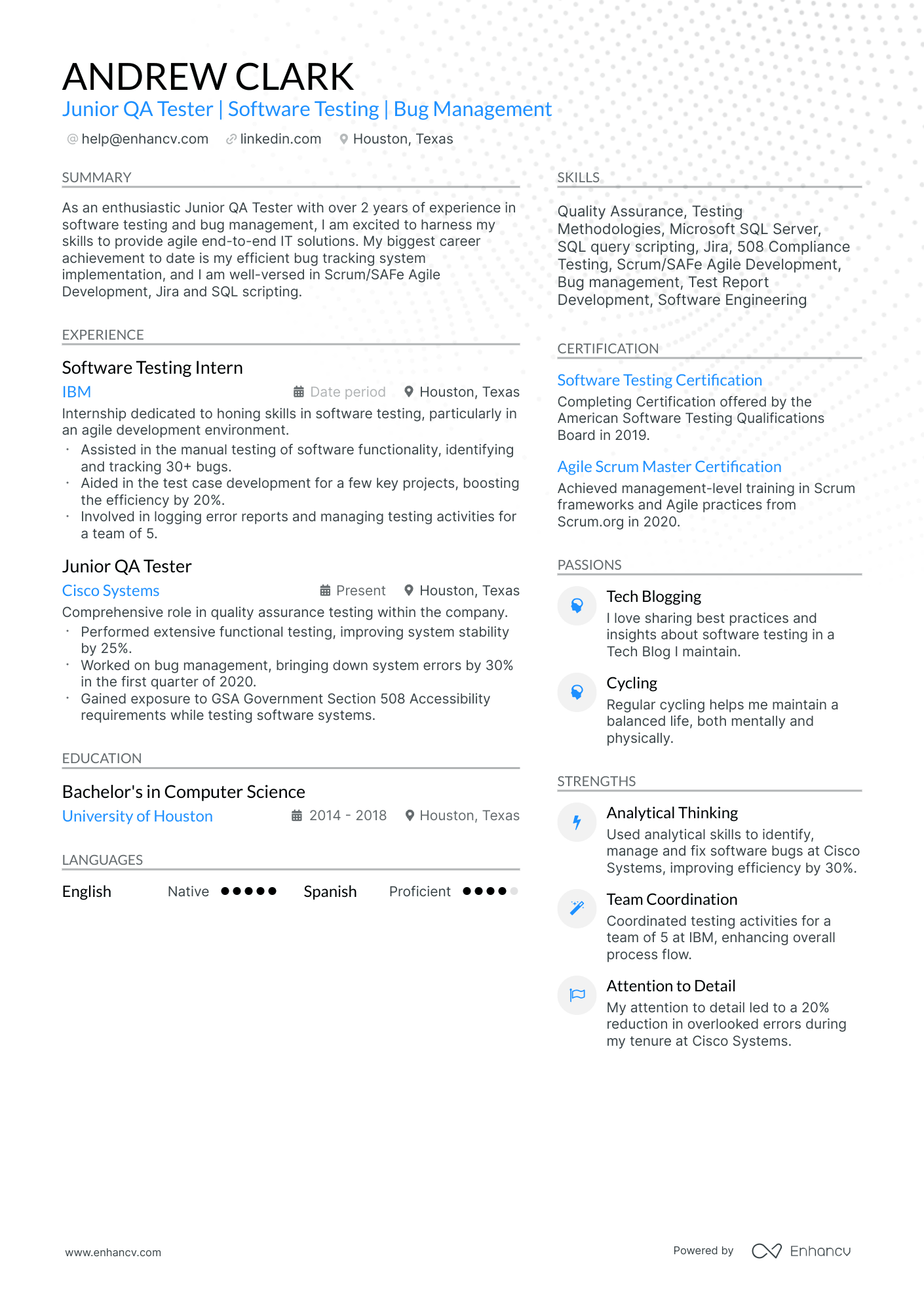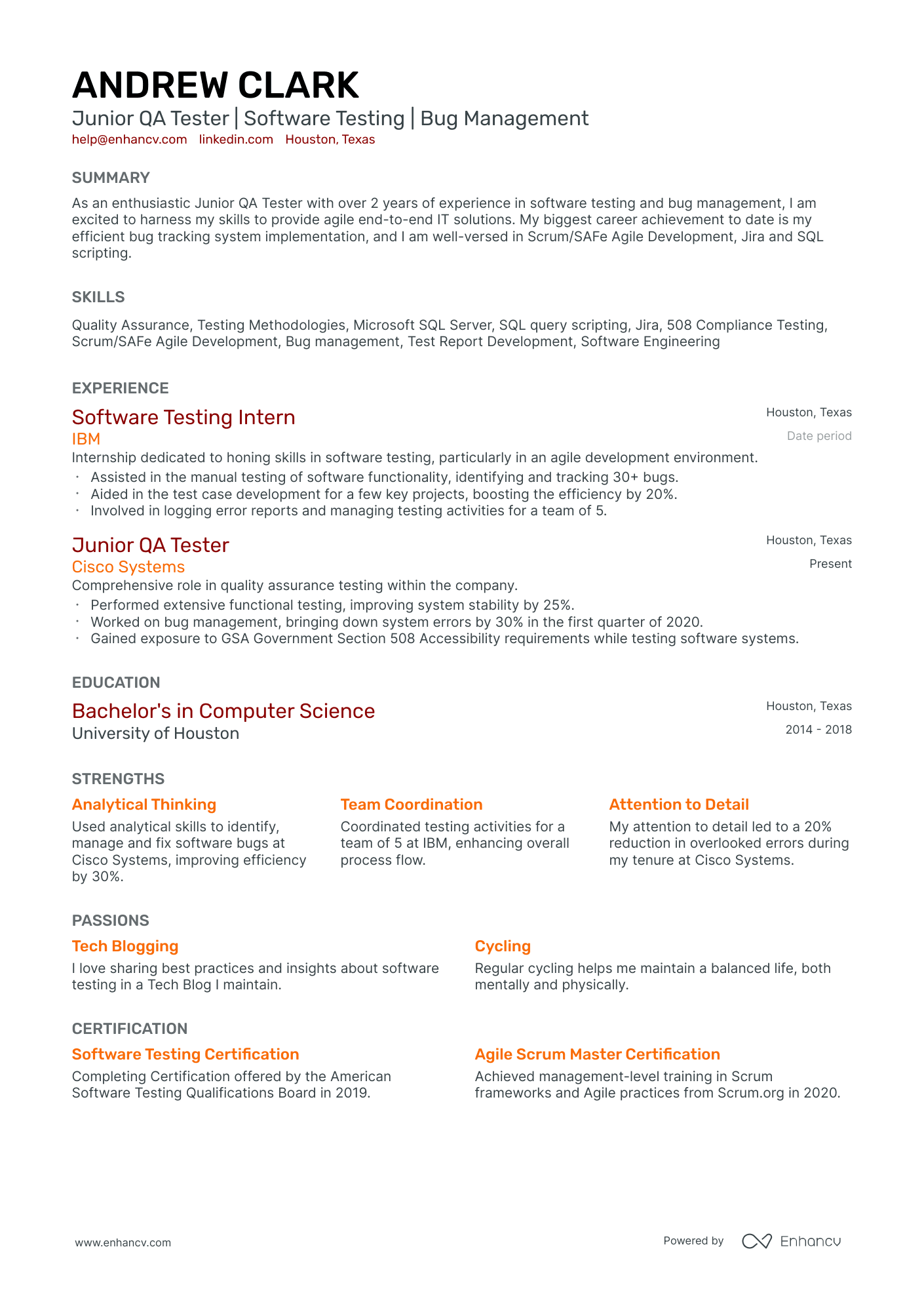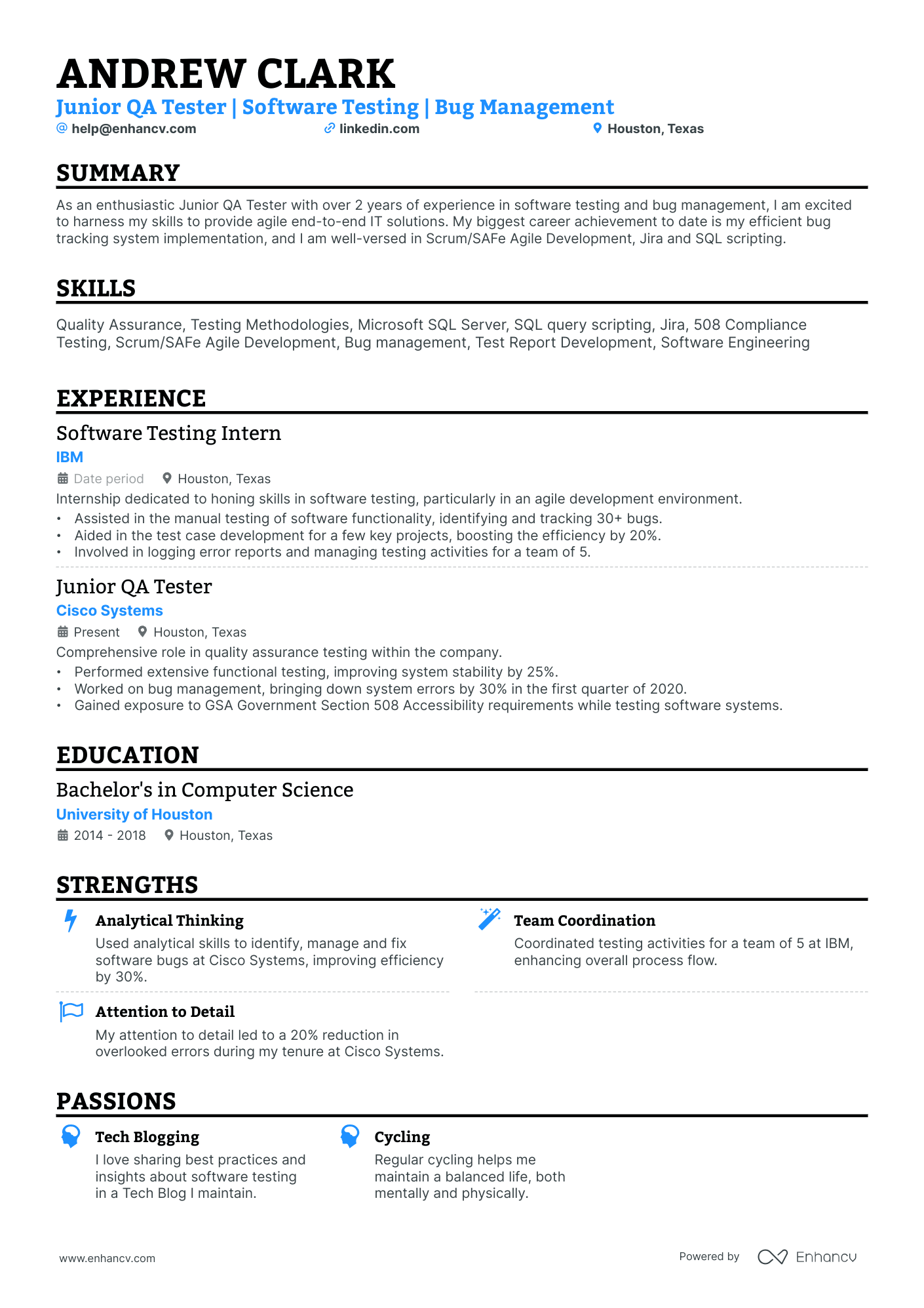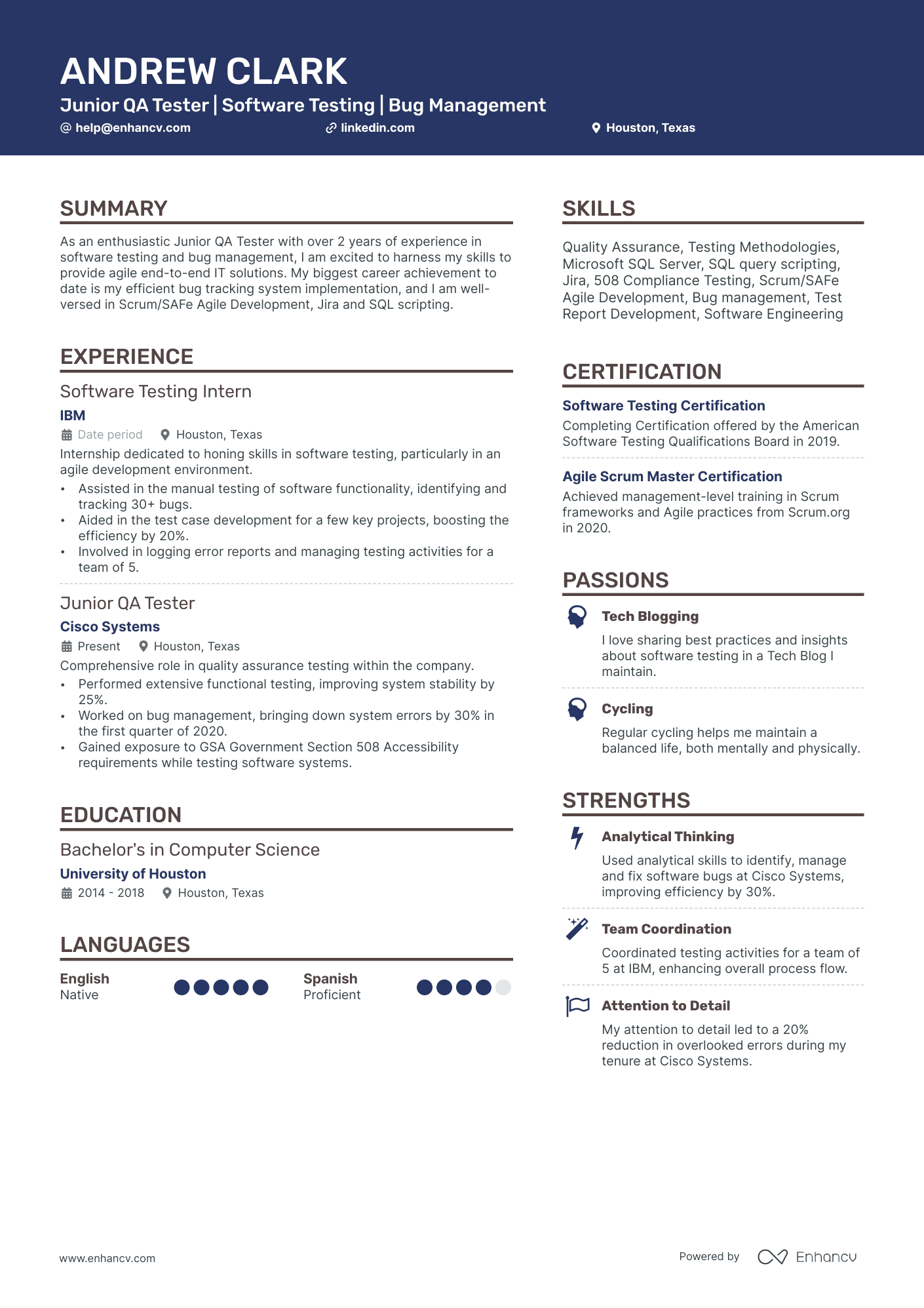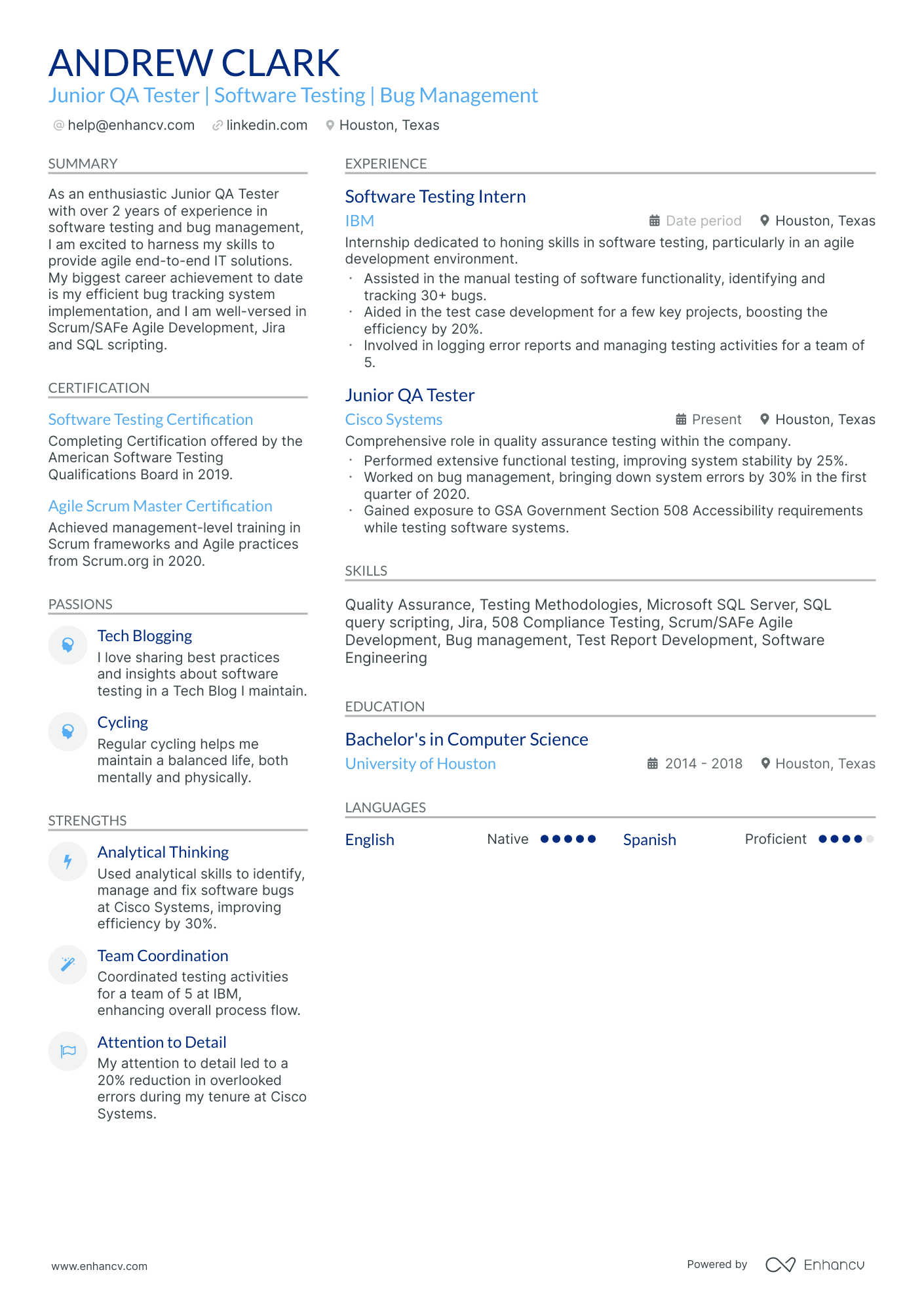A specific challenge faced by a junior QA tester when building their resume is demonstrating relevant technical knowledge and hands-on experience in a field where they may have only limited or no professional background. Our guide can assist in addressing this challenge by providing strategies to showcase transferable skills, academic projects, certifications, and self-learning initiatives that exhibit your understanding of QA testing principles and tools, effectively making you a strong contender for the role.
Here's what you'll read within our professional resume guide:
- Junior QA tester resumes that are tailored to the role are more likely to catch recruiters' attention.
- Most sought-out junior QA tester skills that should make your resume.
- Styling the layout of your professional resume: take a page from junior QA tester resume examples.
- How to write about your junior QA tester achievements in various resume sections (e.g. summary, experience, and education).
Recommended reads:
Deciphering the best format for your junior QA tester resume
To craft an impactful junior QA tester resume, start by thoroughly analyzing the job description.
Your chosen resume format should seamlessly align your experience with the role's requirements.
Consider these four pivotal elements:
- Present your experience effectively. If you boast a wealth of pertinent experience, employ the reverse-chronological resume format, listing roles by date, beginning with the most recent.
- Maintain brevity. Limit your resume to a maximum of two pages, focusing on your most salient attributes.
- Headers serve a purpose. A well-crafted header ensures recruiters can swiftly access your contact details and professional portfolio.
- Opt for PDF. Typically, submit your junior QA tester resume in PDF to preserve its layout. However, always adhere to specific job application guidelines.
Tailor your resume format to the job market – a Canadian resume, for example, might differ in layout.
Upload your resume
Drop your resume here or choose a file. PDF & DOCX only. Max 2MB file size.
Pro tip
Keep your junior QA tester resume clear and concise. Top professionals narrate their career stories while highlighting their strengths.
Essential sections for a standout junior QA tester resume:
- The top section should combine your header—with accurate contact details—and a concise summary or objective that encapsulates your professional achievements.
- An experience section that chronicles your career trajectory and how each role contributed to your professional development.
- Highlight significant achievements that demonstrate the practical application of your skills, leading to tangible results.
- Include industry-recognized certifications to underscore your technical proficiency or interpersonal skills.
- Detail your educational background relevant to the field.
What recruiters want to see on your resume:
- Understanding of Software Development Life Cycle (SDLC): Knowledge about different phases such as requirements gathering, design, development, testing, and deployment.
- Proficiency in QA methodologies: Familiarity with various testing strategies like functional testing, regression testing, performance testing, etc., to identify software defects.
- Basic coding skills: Although not mandatory for every QA tester role, understanding of programming languages like Python, Java, or C# could be beneficial for writing test scripts.
- Experience with testing tools: Hands-on experience using tools like JIRA, Selenium, Postman, etc. that assist in creating and executing tests.
- Problem-solving aptitude: The ability to dissect a complex software system, identify potential problem areas, and come up with effective solutions.
Recommended reads:
Detailing your relevant experience on your junior QA tester resume
Showcase your credibility in the resume experience section. For an effective junior QA tester resume:
- Highlight measurable achievements.
- Scan the job advert for keywords and integrate them throughout your experience section.
- Emphasize your technical proficiencies and how you've applied them in various roles.
- Keep it simple: mention your responsibility, relevant skills, and the outcomes.
- Use this section to convey your unique value, soft skills, feedback received, and the type of company culture you thrive in.
Top professionals ensure their experience section offers a captivating look at their expertise. Check out our sample junior QA tester resumes for guidance.
- Conducted extensive manual testing on web and mobile applications for Company XYZ, identifying and documenting over 100 bugs and inconsistencies.
- Collaborated with development team to resolve critical issues, resulting in a 20% improvement in application stability.
- Executed test cases and scenarios, ensuring adherence to project requirements and deadlines.
- Performed comprehensive regression testing on software releases for Company ABC, detecting and reporting software defects that led to a 15% reduction in post-release issues.
- Developed and executed automated test scripts using Selenium, resulting in a 30% decrease in testing time.
- Contributed to the development of test plans and strategies, providing valuable insights for optimizing testing processes.
- Utilized JIRA and TestRail to track and manage defects and test cases for Company DEF's complex enterprise software solutions.
- Collaborated closely with cross-functional teams to reproduce and investigate reported customer issues, resulting in a 25% reduction in resolution time.
- Assisted in the implementation of an Agile testing framework, facilitating faster delivery of high-quality software.
- Conducted compatibility testing across multiple browsers and platforms for Company GHI's e-commerce platform, ensuring seamless user experiences.
- Created and executed test cases for performance testing, identifying and addressing bottlenecks resulting in a 40% improvement in application response times.
- Collaborated with development team to improve automated testing processes using tools like Jenkins and JUnit.
- Performed end-to-end testing of mobile applications for Company JKL, verifying functionality, usability, and compatibility on iOS and Android platforms.
- Developed and maintained test data and environments, ensuring accurate and consistent test results throughout the testing cycle.
- Participated in defect triage meetings, effectively communicating critical issues to stakeholders resulting in prompt resolutions.
- Executed test plans and test cases for embedded software systems at Company MNO, uncovering and documenting over 50 defects.
- Conducted exploratory testing to identify edge cases and potential vulnerabilities, resulting in improved software robustness.
- Contributed to the development and enhancement of regression testing suites, ensuring maximum coverage of critical functionalities.
- Implemented and maintained automated testing frameworks using tools like Selenium and Cucumber for Company PQR's web applications, resulting in a 50% reduction in manual testing efforts.
- Collaborated with cross-functional teams to define acceptance criteria and user stories, ensuring comprehensive test coverage.
- Performed load and stress testing on cloud-based infrastructure, identifying scalability issues and suggesting optimizations.
- Conducted system integration testing for Company STU's enterprise resource planning (ERP) software, ensuring seamless interoperability with third-party systems.
- Developed and executed complex SQL queries to validate data integrity during the testing process, uncovering critical data inconsistencies.
- Contributed to the creation of automated test scripts using tools like HP UFT, reducing test execution time by 40%.
- Led a team of QA testers at Company VWX, coordinating test activities and ensuring adherence to quality standards and project timelines.
- Developed and implemented test strategies for complex software projects, mitigating risks and ensuring high-quality deliverables.
- Performed root cause analysis of critical defects, collaborating with development teams to implement effective solutions.
- Collaborated with UX designers and developers to conduct usability testing for Company YZA's web interfaces, providing actionable feedback resulting in improved user experiences.
- Identified and reported accessibility issues, ensuring compliance with WCAG 2.0 standards and enhancing inclusivity.
- Contributed to the development and execution of comprehensive test plans for new product releases, ensuring high-quality software deliveries.
Quantifying impact on your resume
```html
- Include the number of projects you have worked on, demonstrating your ability to handle multiple tasks.
- List the number of bugs and errors you have found and reported, as it shows your attention to detail and effectiveness in identifying issues.
- Quantify the sizes of the teams you have been a part of, highlighting your collaborative skills and adaptability to various team dynamics.
- State the amount of time you've reduced in testing phases through optimization efforts, indicating efficiency and problem-solving skills.
- Provide the number of test cases written and executed, showing your thoroughness and commitment to quality assurance.
- Specify the percentage of increase or decrease in defect leakage, representing your contribution to improving product quality.
- Note the number of automated tests developed if applicable, showcasing your technical skills and efforts in efficiency enhancement.
- Mention how many training sessions or workshops you have attended or conducted, reflecting your dedication to continuous learning and knowledge sharing.
```
Navigating the resume landscape without experience
It's not uncommon for candidates lacking direct experience to secure entry-level positions. Their resumes often share these characteristics:
- They opt for a functional or skill-based format, emphasizing strengths over chronological work history.
- Transferrable skills, gleaned from diverse life and work experiences, take center stage.
- The objective section melds career highlights, the motivation behind the application, and the unique value proposition for the role.
- Skills are tailored to meet basic job prerequisites while also spotlighting any specialized expertise.
Recommended reads:
Pro tip
Your experience section should be a testament to your professional growth. If your career journey isn't particularly linear or impressive, focus on detailing specific skills and the tangible outcomes of your responsibilities.
Essential junior QA tester hard and soft skills for your resume
Recruiters evaluate not just your professional history, but also how your skills resonate with the job's requirements.
Your skills are categorized into:
- Hard or technical skills: These reflect your proficiency in specific tasks or technologies.
- Soft skills: These pertain to your interpersonal abilities and how you adapt to various situations.
When crafting your resume, ensure you:
- Highlight five to six skills that directly align with the job description.
- Integrate industry-specific keywords while also emphasizing your unique strengths.
- Support your skills with an achievements section, detailing tangible outcomes.
- Quantify your proficiency wherever possible, rather than merely listing skills.
To help you, we've curated a list of the most sought-after hard and soft skills for junior QA tester roles.
Top skills for your junior QA tester resume:
Selenium
JUnit
TestNG
JIRA
Postman
SQL
Git
Bugzilla
Cucumber
REST API Testing
Attention to Detail
Analytical Thinking
Problem-Solving
Communication
Teamwork
Time Management
Adaptability
Critical Thinking
Organization
Empathy
Pro tip
The placement of your skills section should align with its importance. If it's a showcase of your most significant strengths, position it prominently near the top of your resume.
The importance of your certifications and education on your junior QA tester resume
Pay attention to the resume education section . It can offer clues about your skills and experiences that align with the job.
- List only tertiary education details, including the institution and dates.
- Mention your expected graduation date if you're currently studying.
- Exclude degrees unrelated to the job or field.
- Describe your education if it allows you to highlight your achievements further.
Your professional qualifications: certificates and education play a crucial role in your junior QA tester application.
They showcase your dedication to gaining the best expertise and know-how in the field.
Include any diplomas and certificates that are:
- Listed within the job requirements or could make your application stand out
- Niche to your industry and require plenty of effort to obtain
- Helping you prepare for professional growth with forward-facing know-how
- Relevant to the junior QA tester job - make sure to include the name of the certificate, institution you've obtained it at, and dates
Both your certificates and education section need to add further value to your application.
That's why we've dedicated this next list just for you - check out some of the most popular junior QA tester certificates to include on your resume:
Best certifications to list on your resume
Pro tip
If you're in the process of obtaining your certificate or degree, list the expected date you're supposed to graduate or be certified.
Recommended reads:
Choosing between a resume summary or objective based on your experience
The relevance of a resume summary or a resume objective for your junior QA tester application hinges on your experience.
Both provide a snapshot of your expertise and accomplishments. However:
- A resume objective emphasizes your career aspirations, ideal for candidates looking to balance their experience with future goals.
- A resume summary offers a space to detail your unique value and notable accomplishments, perfect for candidates with a rich career history.
Ensure your introduction aligns with the job description, and if possible, quantify details for a compelling narrative.
Resume summary and objective examples for a junior QA tester resume
Additional sections to amplify your junior QA tester resume
To further personalize your resume and showcase a broader spectrum of your professional journey, consider adding:
- Projects that highlight your hands-on experience.
- Awards that recognize your industry contributions.
- Volunteer work that underscores your community involvement and soft skills.
- Hobbies that offer a glimpse into your personality and passions.
Key takeaways
- Format your junior QA tester resume for clarity and coherence, ensuring it aligns with the role.
- Highlight key sections (header, summary/objective, experience, skills, certifications) within your junior QA tester resume.
- Quantify achievements and align them with skills and job requirements.
- Feature both technical and personal skills across your resume for a balanced portrayal.
